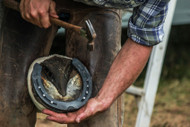Horseshoeing: Yay or Nay
Feb 5th 2021
 A debate has long been raging among horse lovers about whether it's better to shoe horses or let them go bare-hoofed. On the one hand, it could be argued that horseshoes help to protect hoofs, just as the shoes humans wear protect and support our feet. Then there are those who say horses walked and ran just fine without shoes long before the meddling of man.
A debate has long been raging among horse lovers about whether it's better to shoe horses or let them go bare-hoofed. On the one hand, it could be argued that horseshoes help to protect hoofs, just as the shoes humans wear protect and support our feet. Then there are those who say horses walked and ran just fine without shoes long before the meddling of man.
Which side has the upper hand in this debate? Is it better to shoe horses or let them trot and canter as nature intended? In truth, it could depend on a number of factors, including environmental conditions, activity level and type of activity, and even the horse itself. Here are a few considerations before deciding whether to shoe your horse.
A Matter of Convenience
As noted, horses survived for a long time without the need for shoes, so why did people start adding these accessories? To be honest, they add a lot of convenience for riders. Certainly, horses can be ridden without shoes, but this addition is beneficial for a number of reasons.
For starters, it allows horses to tackle nearly any terrain with less worry about hurting their hooves, saving riders from having to figure out whether terrain is suitable for unshod hooves. Shoes can also improve traction and precision, allowing a horse to start and stop more quickly, which is obviously desirable for certain types of riding, such as competitive dressage or racing, for example.
Horseshoes can also help horses distribute the added weight of a rider, saddle, and so on. Perhaps horses didn't need shoes until they had riders adding weight and stress on their hooves and trying to tell them where to walk.
Hoof Growth
The main issue for most horse owners and riders when it comes to the shoeing debate centers on hoof growth and general constitution. Consider that hooves are sort of like fingernails. They grow and must be trimmed and maintained. Where problems occur with horses is when they have weak hooves or the amount of wear exceeds growth, causing them discomfort just as you might feel if you accidentally cut your nails too short or split a nail, for example.
For horses that have healthy, sound hooves to begin with, going barefoot could be a viable option, and one that is actually healthier for the horse in the long run. In time, horses that wear shoes can become dependent on the support, and shoes could cause long term problems and even damage because of compression.
Again, however, this might all depend on a horse's genetics, the terrain it traverses, and the amount and type of riding. The truth is that there are several factors involved in the decision to shoe horses versus letting them go barefoot, not least of which is the owner's willingness to monitor and care for the animal's hooves. You'll simply have to decide on a horse-by-horse basis which option is the most desirable for your animal and your purposes.

